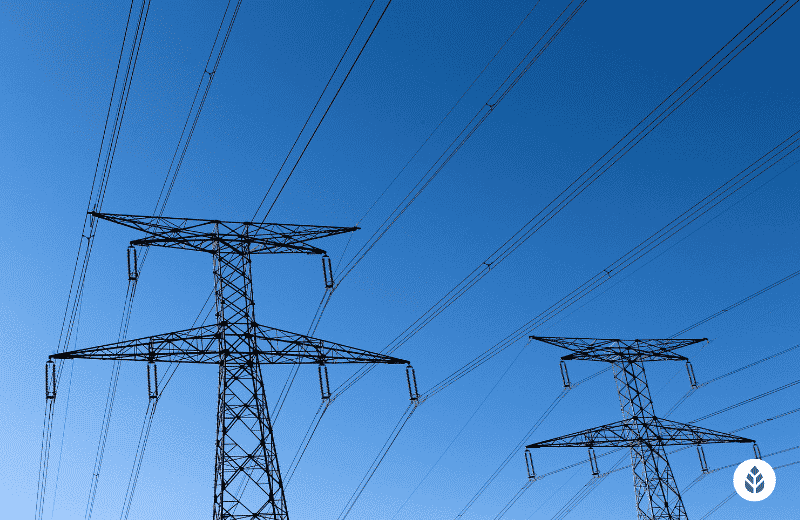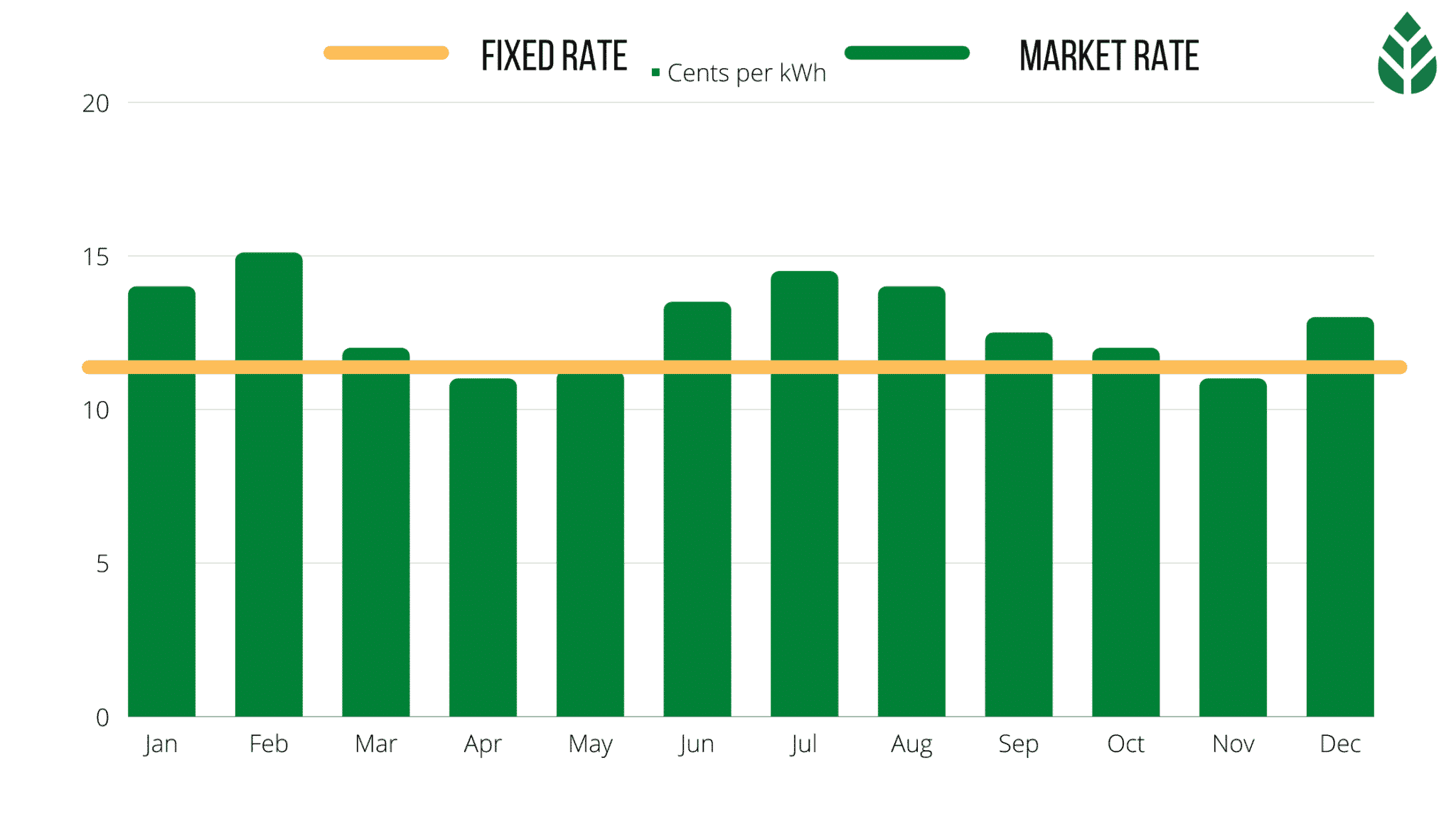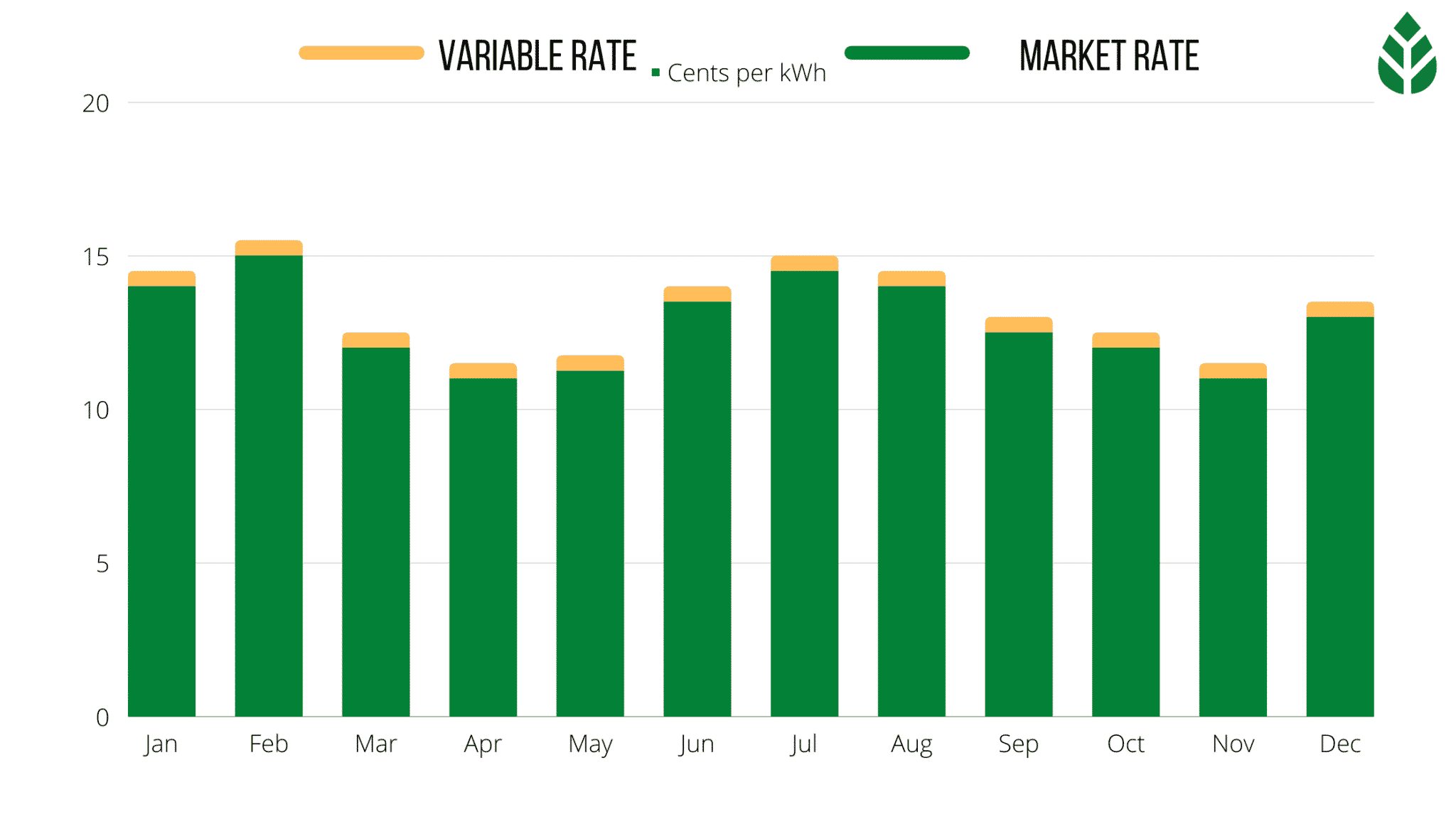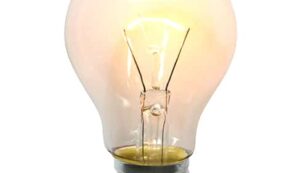

Compare New Hampshire Electricity Rates (2024 Best Prices)
Here’s a quick overview of New Hampshire electricity rates:
- Current average retail rate of electricity: 22.97 cents per kilowatt-hour (kWh)
- Current range of electricity prices in New Hampshire: 16.39 to 17.3 cents/kWh
- Average monthly electric bill: $133.94
- Average energy usage: 630 kWh
Figures accurate as of time of publication.
Each product and or company featured here has been independently selected by the writer. You can learn more about our review methodology here. If you make a purchase using the links included, we may earn commission.
Who Has the Best Energy Rates in New Hampshire?
Currently, Direct Energy has the lowest energy rates of any renewable energy plan at just 16.39 cents per kWh. Click below to compare prices from other top electric companies in your area.
New Hampshire Energy Rates
New Hampshire deregulated its energy market in 1996, which provided homeowners with energy choice. Deregulation increases competition and typically leads to lower energy prices overall, and it provides New Hampshire residents with the right to choose their electric suppliers. The average cost per kWh in New Hampshire is around 22.97 cents, but your specific rate depends on your electric utility and energy supplier.
Most of New Hampshire is serviced by Eversource Energy, but different territories might be served by Liberty Utilities, Unitil Energy Systems or the New Hampshire Electric Cooperative (NHEC). Homeowners can select a supplier to deliver energy from these utilities to their homes via power lines, and the supplier typically sets the price for energy. Your rate could go up or down significantly if you switch to a new energy supplier.
Comparison of Electricity Rates in New Hampshire
In the tables below, we’ll provide energy plans available in New Hampshire so you can see how they compare in terms of contract length and the per-kWh rate. It should be noted that we always recommend plans that use 100% renewable energy, so we’ll only be including these options. You’ll learn more about green energy plans and their benefits below.
Eversource Electricity Rates
| Plan Name | Term (Months) | Plan Rate (¢/kWh) |
| Direct Energy Go Green Lights 24 | 24 | 16.39 cents |
| North American Power 18 Month Renewable Fixed | 18 | 16.94 cents |
| SmartEnergy 6 Months Fixed | 6 | 17.3 cents |
*Rates will vary based on your public utility; you’ll see the rates above if your utility is Eversource. Rates are subject to change.
Liberty Utilities Electricity Rates
| Plan Name | Term (Months) | Plan Rate (¢/kWh) |
| North American Power 18 Month Renewable Plan | 18 | 16.54 cents |
*Rates will vary based on your public utility; you’ll see the rates above if your utility is Liberty Utilities. Rates are subject to change.
Unitil Energy Systems Electricity Rates
| Plan Name | Term (Months) | Plan Rate (¢/kWh) |
| North American Power 18 Month Renewable Fixed | 18 | 16.44 cents |
| SmartEnergy 6 Months Fixed | 6 | 17.3 cents |
*Rates will vary based on your public utility; you’ll see the rates above if your utility is Unitil Energy Systems. Rates are subject to change.

Direct Energy Services

Regional Service
Average cost
Pros
- Many years of experience
- Great industry reputation
- Makes charitable contributions
- Low rates
- Low number of customer complaints
Cons
- Charges contract cancellation fees
- Low number of plans to choose from

SmartEnergy

Regional Service
Average cost
Pros
- Many years of experience
- All plans use clean energy
- No early termination fees
Cons
- No prepaid or no-deposit plans
- Expensive
- Low number of plans to choose from

North American Power

Regional Service
Average cost
Pros
- Many years of experience
- Values transparency
Cons
- Charges contract cancellation fees
- No prepaid or no-deposit plans
- Slightly high number of complaints versus competitors
- Not as many renewable energy options as competitors
How to Find the Best Electricity Rates in New Hampshire
Many New Hampshire residents incorrectly assume that the best energy plan for them is the one with the lowest per-kWh rate. While the cost per kilowatt-hour is important, there are some other crucial things to consider when shopping for the best rate for your needs. We’ll discuss two of these factors below.
Your Energy Usage
First, the amount of energy you consume can often play a major role in determining which energy plan is best for you. Many electric companies in New Hampshire use a tiered rate system to determine energy costs. Tiered rates usually mean that homeowners using well below the average and those using well above the average of 630 kWh per month will have higher rates for electricity. If you don’t use close to the average, a tiered rate might not make sense for you.
Another option offered by some companies is a time-of-use (TOU) rate structure. This option charges all customers the same rate, but the rate can fluctuate based on the time of day you consume energy. If you mostly use electricity during off-peak hours, a TOU plan could work better for you. According to the New Hampshire Public Utilities Commission (NHPUC), peak periods include 2 p.m. to 7 p.m. on weekdays, mid-peak hours are from 7 a.m. to 2 p.m. and 7 p.m. to 11 p.m., and off-peak hours are all other hours plus holidays.1
Contract Length
Many energy plans — typically fixed-rate plans — require that you sign a contract prior to enrollment, which means you’re agreeing to service from a particular provider for a certain number of months. Contract terms can range from one month to several years in New Hampshire. Longer contracts often have lower per-kWh rates, but they also limit your freedom of energy choice temporarily and lock you into one rate for some time.
In addition to the term of the contract, it’s also important to review the fine print. Some contracts have hidden sign-up fees or early-cancellation fees if you decide to terminate your contract early. Others might include introductory rates that increase after a given period. You should always read your contract carefully. If you’re in doubt about which plan is right for you, you can use this tool or the buttons below to help guide you through the process and find the best one.
Types of Electricity Plans in New Hampshire
Part of the reason finding the best energy plan is so challenging is that the plans often include industry terminology that can be a bit confusing at first glance. To help you better navigate the different plan options in New Hampshire, we’ll explain the types of plans you’ll see and provide some pros and cons of each.
Fixed-Rate Plans
As the name implies, fixed-rate plans include a fixed rate for your energy, which means you’ll be charged the exact same amount per kWh you consume for the entirety of your contract. This confuses some homeowners into thinking that their monthly bills will always be the same amount, which is untrue. If you use more electricity, your bill will be higher, but the rate per kWh will be the same.
We generally recommend fixed-rate plans because they provide peace of mind that your electric costs won’t unexpectedly increase due to low energy supply or high demand. In many cases, these plans will turn into variable-rate plans automatically at the end of the contract term, so be sure to read the fine print and choose a new plan if you want to retain a fixed rate.
| Pros of a Fixed-Rate Energy Plan | Cons of a Fixed-Rate Energy Plan |
| Allows for easier budgeting | These plans often have early cancellation fees |
| Nothing can cause your electricity rates to increase | They can be more costly than variable-rate plans if local energy prices are low |
Variable-Rate Plans
Variable-rate plans have a per-kWh rate that changes over time based on local electricity market price. The price you pay for power could change from day to day or over a span of a few months. These plans can sometimes be more affordable than fixed-rate plans if local prices remain low, but there’s also the possibility of energy rate spikes during times of crisis or when demand is high.
Variable-rate plans come with other benefits as well, including no contract requirement and no early-termination fees.
| Pros of a Variable-Rate Energy Plan | Cons of a Variable-Rate Energy Plan |
| Potential to save money if local prices remain low | Electricity prices could increase unexpectedly |
| Usually no contracts or early-termination fees | These plans could be far more expensive than fixed-rate plans if local prices spike or remain high |
No-Deposit and Prepaid Energy Plans
Many energy plans require some kind of up-front payment, which could include sign-up fees or activation fees. Customers looking to avoid these charges can opt for a no-deposit energy plan. These let you avoid up-front costs if you can pass a credit check, as the deposit is a safeguard against non-payment.
If you’re unable or unwilling to pass a credit check but still want to keep up-front costs to a minimum, you can also opt for a prepaid energy plan. These let you add money to your account to pay for electricity as you go. They sometimes come with slightly higher rates, but there are no contracts or early termination fees, and you’ll always know the maximum amount you could pay for electricity. However, if you forget to top up your account, you could be looking at a power outage.
| Pros of a Prepaid Energy Plan | Cons of a Prepaid Energy Plan |
| No sign-up fees | You could experience an outage if you forget to add money to your account |
| Easiest to budget with | Most come with slightly higher rates |
| No contracts and no cancellation fees |
Green Energy Plans
Green energy plans are those that use exclusively renewable energy sources to provide you with power. These plans can also be fixed-rate or variable-rate, and they come with a variety of contract lengths and conditions. We always recommend green energy plans because they let you reduce your carbon footprint and reduce strain on the environment, sometimes while saving money on your utility bills.
New Hampshire has a Renewable Portfolio Standard (RPS) goal of producing 25.2% of its electricity via clean energy sources by 2025.2 According to the Energy Information Administration (EIA), around 10.5% of New Hampshire’s electricity generation comes from clean energy sources, so there is a chance that New Hampshire will incentivize green energy plans in the future, making them more affordable and more widely available.3
| Pros of a Green Energy Plan | Cons of a Green Energy Plan |
| Reduces your carbon footprint and your contribution to pollution | Often a touch more costly — around 1 to 2 cents more per kWh on average |
| Lets you support clean energy without having to install solar panels | Not as many plan options available |
Business Energy Plans
Lastly, business energy plans are designed for business customers. These plans assume a higher energy requirement than residential customers and adjust the rates accordingly. These aren’t available to homeowners and are instead reserved for commercial customers, government agencies, schools, churches and industrial purposes.
Business energy plans aren’t as common as residential plans, so if you need one, you’ll likely have to shop around a bit just to find companies that offer them.
Electric Companies and Providers in New Hampshire
Thanks to energy deregulation, New Hampshirites have their choice of energy suppliers and can choose the one with the plan that suits them and their budgets most closely. While there is no such thing as a best utility company in New Hampshire that will be ideal for everyone, the companies shown below are among our top-rated in the state.
SmartEnergy
- Overwhelmingly positive customer reviews
- Green energy plans available in NH
- Fixed-rate plans offered
- Below-average energy rates for the state
Direct Energy
- Positive online reviews
- 100%-renewable energy plans available
- Fixed-rate options provided
- Relatively affordable
North American Power
- Green energy plans offered
- Fixed-rate contracts offered
- Relatively affordable
What to Look For When Choosing an Electricity Provider in New Hampshire
As we mentioned above, choosing an energy provider is more involved than picking the one with the lowest per-kWh rate. There are many factors you should consider, all of which can have an impact on your experience with your supplier and how much you pay overall for energy. Below, we’ll include some information on the criteria you should consider when choosing a local utility company.
- Plan Options: First, you should look at the plan options available to see if the supplier suits your needs. We recommend fixed-rate plans for the peace of mind and consistency of the energy price, but you can also opt for variable-rate plans, prepaid plans and more.
- Energy Source: Unfortunately, many electric companies in New Hampshire still use predominantly fossil fuels like coal and natural gas to produce energy. We strongly recommend choosing a 100%-renewable energy plan to reduce your carbon footprint and improve the environment.
- Energy Price: The rate per kWh is an important consideration and often plays the most significant role in how much you’ll pay monthly for energy. Lower prices are often better, but the other factors discussed here should be considered carefully as well.
- Contract Details: You will want to look at the contract term to see how long you’re locked into your rate. You should also check the fine print to see if there are early termination fees, introductory rates that could increase or other specifics that affect you and your payments.
- Customer Reviews: It’s worth reading through some positive and negative customer reviews for a company to see what kind of experience you can expect. Some electric utilities with appealing terms and rates might have poor customer service, making them a worse choice overall.
- Company History: Finally, you should look at how long the company you’re considering has been in the industry. Energy companies with longevity are more likely to provide consistent, quality customer service.
FAQ: New Hampshire Electricity Plans
The EcoWatch team gets questions regularly from New Hampshire residents about how to choose the best electricity plan for them. Below, we’ll include some of the most common questions we see, as well as our responses.
Of all the electric suppliers that provide 100%-renewable energy plans in New Hampshire, Direct Energy has the lowest rates. Although the average price per kWh in NH is around 22.97 cents, Direct Energy’s Go Green Lights 24 plan maintains a per-kWh price of just 16.39 cents.
There is no single provider that will be best for every New Hampshire homeowner, as each offers different rates, different plans and varying contract terms that appeal to different electric customers. However, one of our top-rated energy suppliers in New Hampshire is SmartEnergy. This company offers 100%-renewable energy plans, has fixed-rate options for peace of mind, maintains great customer reviews online and has affordable pricing.
One of the best and easiest ways to lower your electric bill in New Hampshire is to choose a different energy supplier that has a lower rate. Thanks to New Hampshire’s deregulated energy market, residents can choose which supplier they want and can base their choice, in part, on the rates. You could save several cents per kWh simply by choosing a new electric supplier.
You can also reduce your electricity bill in New Hampshire by improving your home’s energy efficiency. Some of the most effective ways to do this include replacing your insulation, upgrading windows and doors, installing high-efficiency light bulbs and replacing your old thermostat with a smart thermostat. You can get some additional tips by reading our home energy efficiency guide.
Just like with energy suppliers, there is no energy plan that will be ideal for every homeowner. You will need to choose the plan that works best for you and your budget, meaning you should take into consideration the contract term, the per-kWh rate, the type of plan, the source of energy and more. We recommend starting your search with SmartEnergy, Direct Energy or North American Power, as these companies all offer 100%-renewable energy plans.

 233k
233k  41k
41k  Subscribe
Subscribe 






